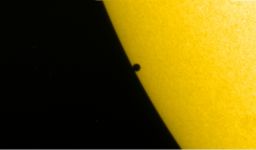Emily Lakdawalla • Sep 08, 2009
Planetary Radio Q and A: How do you know which way a star rotates?
This week's Planetary Radio features Hal McAlister, director of the Mount Wilson Institute; he had just returned to the peak after the worst fire danger had passed when Mat interviewed him. On "Questions and Answers" I answered the question:"They recently announced the discovery of an extrasolar planet that moves backwards around its star. How do they know which way the star rotates?"
Many thanks to Darin Ragozzine for explaining the following to me.

NASA / TRACE
The 2006 Transit of Mercury
This image from the Transition Region and Coronal Explorer (TRACE) satellite shows the Sun in visible light at 19:13:01 UT on November 8, as Mercury's disk began to transit the Sun. Mercury is blocking a part of the Sun that rotates toward us, marginally dimming its most blue-shifted light.It's not easy to tell which way a star rotates unless you have help from one of its planets. As a star rotates, the half of it is Doppler-shifted toward Earth, and half of it is Doppler-shifted away, spreading out its light along the electromagnetic spectrum. When a planet passes in front of the star, it cuts off some of the light from one side of the star, then the other. If the planet is an ordinary prograde one that moves in the same direction that the star rotates, then it starts by covering up the part of the star that is rotating toward us, reducing the amount of light from the star that is Doppler-shifted toward the blue end of the spectrum, and finishes its transit by covering up the part of the star that is rotating away from us, reducing the amount of light from the star that is Doppler-shifted toward the red end of the spectrum. But when WASP-seventeen transited its star, it began by covering up the part of the star that was rotating away from us, proving it moved in a retrograde orbit.
Please don't hesitate to send me an email if you have a planetary-science-themed question that you'd like to hear answered on Planetary Radio!
The Time is Now.
As a Planetary Defender, you’re part of our mission to decrease the risk of Earth being hit by an asteroid or comet.
Donate Today

 Explore Worlds
Explore Worlds Find Life
Find Life Defend Earth
Defend Earth

